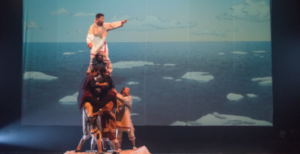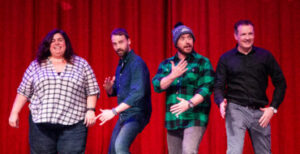Giuseppe Verdi was one of history’s most illustrious Shakespeare fanatics. Think of him as the Kenneth Branagh of 19th century opera. And while he only produced three Shakespeare adaptations to Branagh’s five (so far), all of them are operatic gold.
So, when I received my program at Bard on the Beach’s celebration of Verdi on Monday night, I was surprised to note than only one number from a Shakespearean opera was being performed. Because I am mercilessly pedantic, this irked me a little. There’s plenty of excellent material to choose from in Verdi’s Macbeth and Otello, so why leave his whole Shakespearean legacy to hang solely on the final scene from Falstaff? At a Shakespeare festival, no less!
But, all such thoughts vanished from my mind, long before the intermission. Shakespearean or not, Viva Verdi! is an exceptional evening of music, courtesy of the UBC Opera Ensemble and the Vancouver Opera Orchestra, under the steady baton of Leslie Dala.
Hearing Verdi in Bard’s giant tent by Kits Beach (the acoustics of which are better than you might expect) seemed right somehow. Verdi’s art, like Shakespeare’s, deals with universal themes and features well-crafted, sympathetic characters. Both men produced eminently accessible works for the theatre, and both seem to have found their way out of the theatre and into our popular culture. (Case in point: this moment from Rigoletto.) The arias and ensembles that we heard on Monday night seem as if they were written for a casual setting like this, just as Shakespeare’s plays invariably do.
Thankfully though, the program wasn’t exclusively devoted to the big recognizable tunes of Verdi’s oeuvre, although the UBC Opera Ensemble acquitted themselves ably in the familiar drinking song from La Traviata and the anvil chorus from Il Trovatore. The evening’s highlights all rank among the most sublime and challenging moments in Verdi’s music.
The excerpts from Trovatore featured soprano Rhoslyn Jones as a special guest. Jones is an alumnus of the UBC Opera Ensemble who has gone on to sing opposite Placido Domingo, among other accomplishments. Another seasoned professional joined her onstage: tenor Weilong Tao, who has sung on stages across Europe and Asia, and is now studying at UBC.
As you might expect, these two delivered some of the night’s best singing, but the young singers of the ensemble all display tremendous musical gifts, and maturity far beyond their experience. Surely, a great deal of the credit must go to Nancy Hermiston, who founded the UBC Opera Ensemble in 1995, and continues to direct it today. And, to boot, the show is double-cast, so presumably the ensemble boasts twice as much maturity and musicality as I saw.
One role that isn’t doubled, through, is the lecherous Duke from Rigoletto. Tenor Tony Caruso has a lock on that one, at all four performances of the program. His surname is an auspicious one for a young tenor, and he has the pipes to live up to it. The Duke is one of Verdi’s show-off roles, and Caruso shines in the famous quartet where a shameless seducer, a willing victim, a spurned lover and a protective father outline their respective agendas all at once. This is one of those sublime moments I mentioned, and the students of the UBC ensemble, particularly Caruso, do it plenty justice.
Speaking of sublime moments: the final scene from Falstaff turned out to be Verdi’s last operatic statement, and he made it count. As the opera’s complicated plot (based on Shakespeare’s The Merry Wives of Windsor) comes to a close, disguises are lifted, punishment is doled out where it’s due, and the whole company spontaneously realizes that “The whole world’s a joke.” The fugue that Verdi sets to those words is one of opera’s most exhilarating finales.
So, when the whole ensemble comes onstage at the end of Viva Verdi! to perform the scene, it plays less like a grand finale for an evening’s entertainment than like a grand, celebratory summation of Verdi’s legacy.
And of course, that’s exactly what this concert is about. If you’ve read anything about classical music so far this year, you know two things: that 100 years ago this year, Stravinsky’s Rite of Spring premiered, and that 200 years ago marked the birth of both Wagner and Verdi.
200 years on, Wagner’s operas continue to infuriate audiences with their lack of melody and appalling length. Meanwhile, Verdi’s continue to charm us with their memorable tunes and sophisticated social critiques.
So, if you’re yet to perform your civic duty as an opera fan by paying tribute to Verdi’s bicentenary in some public way, you might consider supporting some promising young artists by taking in Viva Verdi!









